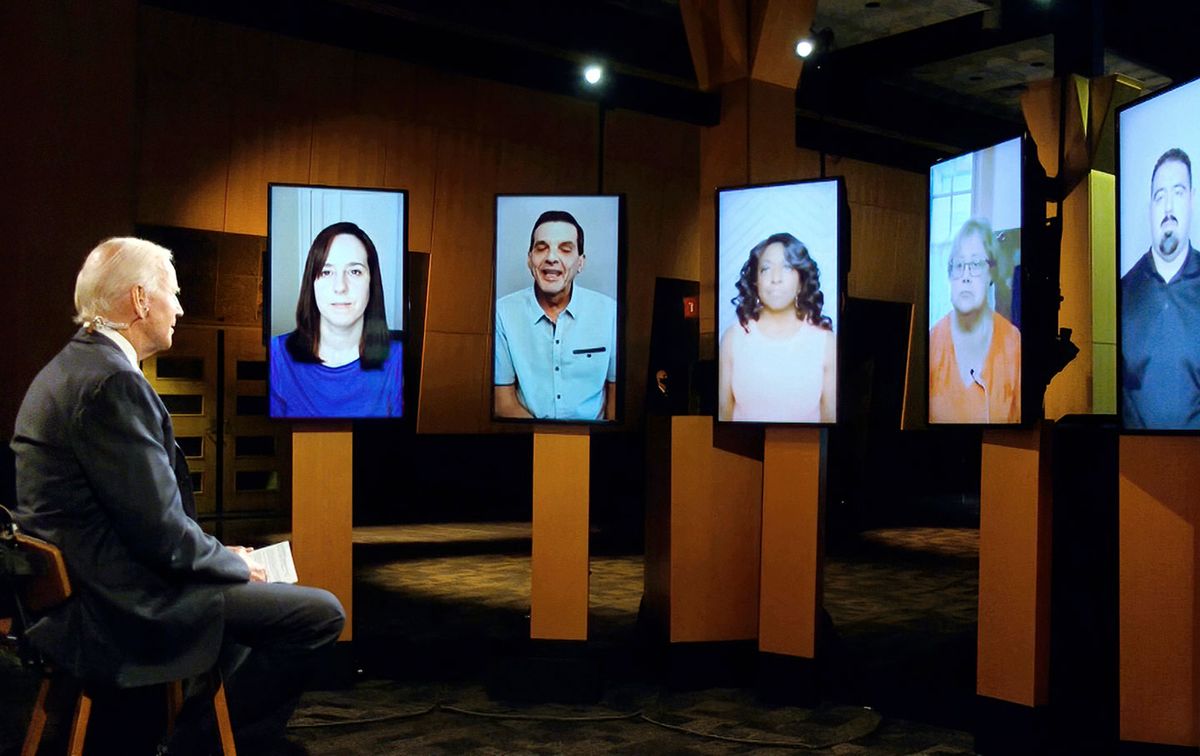The Democratic convention is pulling together diverse voices. Is a big-tent coalition a winning strategy?

A few minutes every morning is all you need.
Stay up to date on the world's Headlines and Human Stories. It's fun, it's factual, it's fluff-free.
This year’s Democratic convention started on August 17 and runs through Thursday, August 20. Originally scheduled to take place in Milwaukee, Wisconsin, the event was moved to a livestream video format due to the coronavirus pandemic.
The first two days of convention speaking slots were given to speakers with a variety of backgrounds.
While the majority of the speakers were Democrats, there were also Independents and Republicans featured at the event, perhaps most prominently John Kasich, a conservative former governor of Ohio and Colin Powell, the former secretary of state under President George W. Bush.
As for the different ideological positions featured at the event from within the Democratic Party, both moderate Democrats spoke alongside members of the progressive wing of the party.
Representing the party establishment, former Presidents Jimmy Carter and Bill Clinton had speaking slots at the event, along with Senator Minority Leader Chuck Schumer and former Secretary of State (and 2004 Democratic presidential nominee) John Kerry.
As for the progressive wing of the party, the first two days of the convention featured Bernie Sanders and Alexandria Ocasio-Cortez, two of the most prominent members of the progressive left.
Michelle Obama and Jill Biden, the former first and second lady of the United States, were also featured over the first two nights.
Michelle and Jill in the spotlight
Michelle Obama, the speaker with the most airtime on the first night of the convention, has a 60% approval rating nationwide among registered voters, significantly higher than both Trump and Joe Biden.
During her speech, she portrayed President Donald Trump as an incompetent leader who is unsuited to lead the country for another four years, but also looked to maintain her empathetic outlook and demeanor.
Jill Biden, meanwhile, made the case for Joe Biden on personal terms, stating that by giving the leadership of the country to him, he would do for all American families what he did for theirs – namely “bring us together and make us whole.”
Reactions to Michelle Obama’s speech were largely positive among liberals, but conservatives and some on the progressive left also found fault with it. In particular, President Donald Trump pushed back on her arguments that he was unsuited for the role.
After the speech, in which Obama called Trump “in over his head,” Trump responded in kind, telling reporters during an event dedicated to the 100th anniversary of the 19th Amendment to the US constitution, which gave women the right to vote, that her speech was “very divisive” and that she was the one who was in “over her head.”
Some analysts on the progressive left were also critical of her speech, albeit for different reasons. According to Cenk Uygur, the host of the progressive opinion program “The Young Turks,” Obama’s decision to “go high” in her remarks was a mistake, alluding to her tendency to aim for the moral high ground in her political speeches.
“She went and explained ‘going high’ again. It was word salad. It was probably the worst part of the speech,” argued Uygur. According to his analysis, attempts to keep up any sense of goodwill toward political opponents or a positive overall outlook is a mistake since the Trump administration refuses to play on those terms.
“[The argument that says] we should go high, because we’re better … but then let’s make sure that we fight hard anyway [for what we believe in] that doesn’t really mean anything,” he added, suggesting that politics is a zero-sum game.
Republicans for Biden
For John Kasich, a prominent conservative who ran for president as a Republican in 2016, America is at a crossroads between the path it’s on and what it could possibly become. Kasich argued that the current path set by President Donald Trump has led to “division, dysfunction, irresponsibility and growing vitriol.”
He also spoke to the unique circumstances of a conservative publicly endorsing a Democrat for president and urged others who might be uneasy with President Donald Trump to consider voting for Biden despite any ideological differences.
“I’m sure there are Republicans and Independents who couldn’t imagine crossing over to support a Democrat. They fear Joe may turn sharp left and leave them behind. I don’t believe that because I know the measure of the man. It’s reasonable, faithful, respectful,” he added.
Although some Democrats lauded Kasich’s speech as evidence that some Republicans are fed up with Trump’s governing style, some conservatives took Kasich’s endorsement as a betrayal. Others on the progressive left also criticized his slot at the convention, arguing that someone with conservative views had no place at the Democratic event.
Tom Perez, the chairman of the Democratic National Committee, defended Kasich’s inclusion, stating that “politics is about arithmetic” and that “addition beats subtraction any day of the week.”
Despite Kasich’s announcement, however, some political analysts are doubtful whether his endorsement will have a substantial impact on other conservatives, including those in his home state of Ohio.
“Much like the Republican Party, Ohio has undergone a transformation of its own over the last decade. With a population that’s older, whiter, and less educated than the rest of the country, it’s no longer a bellwether state but one expected to vote for Republicans in the presidential contest,” wrote Jacqueline Alemany, a writer for The Washington Post.
A CBS News poll released at the end of July found that Trump was leading Biden in Ohio by one percentage point in the race for president. In 2016, Trump won the state by eight percentage points.
Have a tip or story? Get in touch with our reporters at tips@themilsource.com




Comments ()